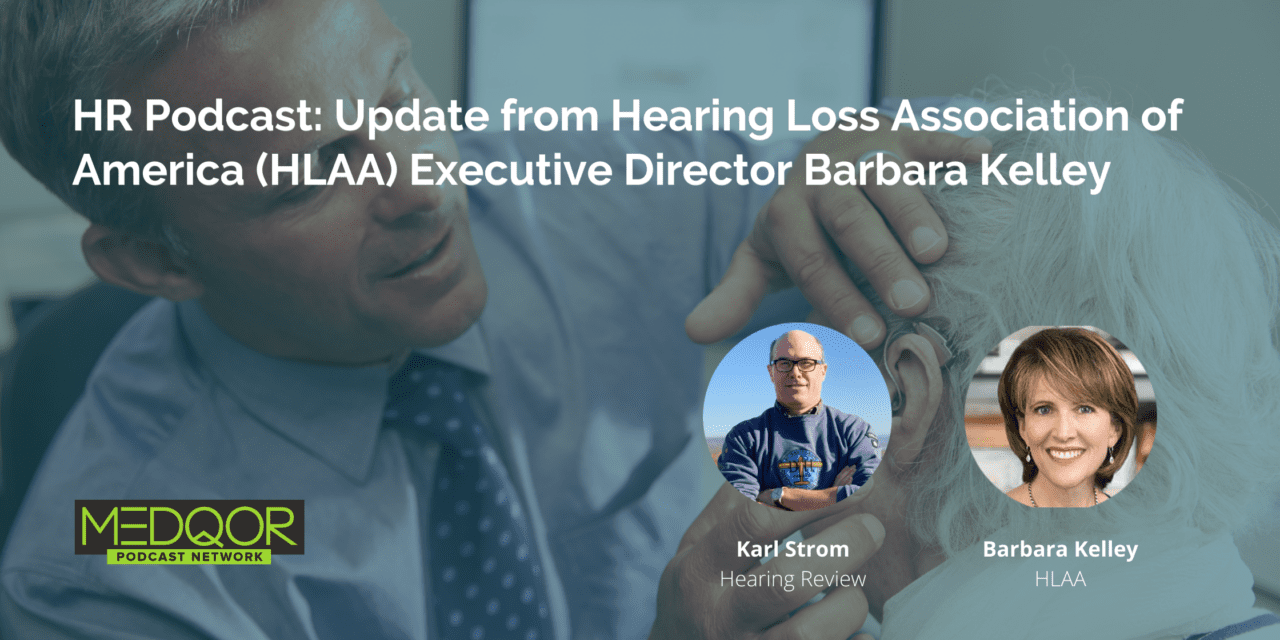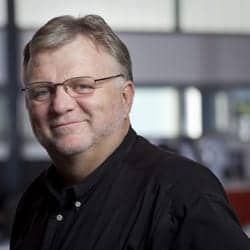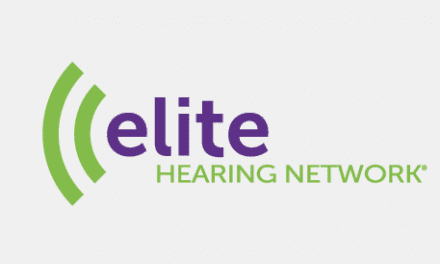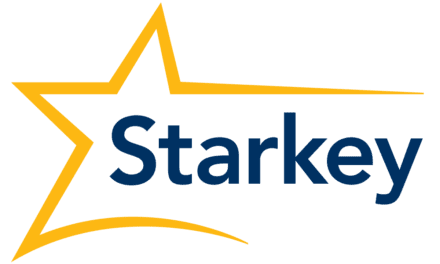The Hearing Loss Association of America (HLAA)—the largest US advocacy group for people with hearing loss—has been busy working with the FDA, FTC, FCC, HHS, NIDCD, CTA, and the various professional and industry groups in hearing healthcare on virtually everything related to hearing and access issues. In this 26-minute podcast, HLAA Executive Director Barbara Kelley talks with Hearing Review Editor Karl Strom about:
- HLAA’s plans for its upcoming convention on June 23-25,
- Thoughts and concerns about the FDA’s proposed rules for over-the-counter (OTC) hearing aids,
- The possibility of Medicare coverage for hearing aids and related services in the near future,
- How diversity, equity, and inclusion in hearing healthcare might be improved and expanded, and
- Information about the early-2022 website launch from the Industry-Consumer Alliance for Accessible Technology (ICAAT)—a collaboration between HLAA, Gallaudet University and the American Institutes for Research—that brings together technology developers with consumers who have hearing loss to create and inspire more accessible, innovative and responsive technologies.
Podcast Transcript
Karl Strom:
Welcome to The Hearing Review podcast. I’m Karl Strom, editor The Hearing Review magazine and its website at hearingreview.com. Today I have as my guest, Barbara Kelley, the executive director of the Hearing Loss Association of America, or HLAA. We’ll be talking today about the organization’s upcoming convention in June, as well as discussing some of the hot topics in hearing healthcare and getting her viewpoints from a consumer perspective. Welcome Barbara. It’s so nice to see you. And so kind that you’ve spent time with us today. What’s up with you, what’s new?
Barbara Kelley:
Well first, hi Karl? And thank you for inviting me. It’s a real pleasure to be here and talk to your audience. Well, there’s lots of exciting things happening on the hearing healthcare scene, as you probably know, and I’m just really thrilled to be here today to talk to you about them.
Karl Strom:
Now, like you, I knew the original founder of HLAA, “Rocky” Stone. And even sometimes I still mistakenly call HLAA, SHHH which is the acronym for Self Help for Hard of Hearing People. I know you were hired by “Rocky” back in 1988, and you’ve been really instrumental in HLAA’s growth and success through the decades. Also, serving as editor of its terrific publications, the SHHH Journal and Hearing Life. And I believe you even won some well deserved awards for the publication. You then became HLAA’s deputy executive director in 2008, working with Brenda Battat and Anna Gilmore Hall. And you were then named executive director in 2016. Now, for those people who are not familiar with HLAA, can you tell us a little bit about the organization’s mission and how it serves as a prime advocate for people with hearing loss?
Barbara Kelley:
Well, I’d be happy to Karl and I love how you started this out because you knew our founder, “Rocky” Stone. We were founded in 1979 as I did. And you still sometimes call our organization S-H-H, SHHH some people call. I have to admit around our dinner table at home, we often still call it that. But that gives me something really to talk about because the organization was founded Self Help for Hard of Hearing People. And in the late seventies and early eighties Self Help was really in style. That was the lingo of the day.
Barbara Kelley:
But that philosophy remains true today. And we believe that you give people all the information. Good, credible, unbiased information, and then they can make their own choices about their hearing healthcare and what to do about it. That remains the same. It’s still the vision. Our mission is to open the world of communication to people with hearing loss, through information, education, support and advocacy. And a lot of that support comes in our chapter network across the country who do educational programs. Sure, they do advocacy at the local level, but that peer to peer support is important to Self Help. Not just getting information, but hearing what other people have experienced and gone through. The times have changed, but I think our vision and our mission have very much stayed the same.
Karl Strom:
And you’re right. That’s one of the cool things about HLAA, is that you have a collective membership that shares their ideas and bounces hearing solutions and life hacks to do well with the hearing that they have.
Barbara Kelley:
Right. I love that term life hacks. That’s great way to put it, Karl. I might copy that and quote you.
Karl Strom:
Let’s talk a little bit about HLAA’s upcoming convention, which will be held on June 23rd to the 25th in Tampa. For people who’ve never been to an HLAA convention, what should they expect and what should they know about this year’s convention?
Barbara Kelley:
Oh, I’m so excited to talk about it because of course, for the past two years, our convention had to go virtually online with the COVID 19 pandemic. We’re excited to be back in person because although we offer educational programs and webinars throughout the year, it’s just not the same as being in person. And that’s where we have workshops for people with hearing loss, any degree of hearing loss, any type of technology that they use from no technology to hearing aids, to cochlear implants, to hearing assistive technology. We have workshops geared toward the person with hearing loss. We also have a research symposium that is sponsored by the National Institute on Deafness and Other Communication Disorders.
Barbara Kelley:
And this year, the topic is cochlear implants and what’s new. There is a lot of new coming out in the research. And the idea of our research symposiums, which are held every year at our convention, is to get the scientists to come, the top researchers in the field and present to you and me, the lay audience, who can understand the science and what it means to my life as a person with hearing loss. We have a research symposium, we have companies who come and exhibit.
Barbara Kelley:
And our community or people who associate themselves with HLAA, are typically people who want to stay in the hearing world with technology. We have exhibitors who come and then I have to say, we add in a lot of fun. And we’ll have some fun events, some get together events. But again, that’s where that peer to peer support happens. Where I say, it’s a place where it’s okay not to hear well, because first of all, everybody understands what you’re going through. Our sessions are communication accessible with hearing loops and captioning, and it’s a great experience. And if people have never been to one, I would just encourage them to try it out.
Karl Strom:
I would too. One of the cool things, you see people orienting their tele coils, and all these ways that they figured out how to really hear well in all these different situations. And they share all of their tips. And I think it’s just a terrific gather.
Barbara Kelley:
It is. And I remember years ago when I was new to the organization, I was at one of my first conventions. I was in the exhibit hall and a man ran up to me was so excited what he had seen. He goes, “Barbara, I would wear antenna coming out of my head, if it would help me hear better.” And that encapsulates how people think, their motivation. But it’s one of my favorite events of the year and I just wish people could all experience it.
Karl Strom:
Right. What are some of the convention highlights that attendees have told you about out that say, this is just absolutely vital or some of your favorite tips or events that happen regularly at the convention?
Barbara Kelley:
Well, definitely the research symposium is really popular. Oftentimes in our workshop or with our keynote speakers, people will have an opportunity maybe to attend something in an environment where they can hear. For example Karl, if there’s a program in your local community, say it’s on financial planning or something like that, you might not be able to attend because you know, already there’s going to be a communication breakdown. We often have tried to offer few workshops like that, where people can attend, we have a yoga workshop, that’s going to be all communication accessible. We throw in a little bit of lifestyle things where people might not have the opportunity. I think the exhibit hall is a chance to see things all in one place and really talk to our corporate partners one on one. Plus I don’t know, there’s always some fun event depending on the city where we go. I love it all. We always have an award’s reception, and we highlight the stars of HLAA. We have a couple really important awards we’re giving this year.
Karl Strom:
Cool. That’s great. Well, I think you’d agree that there’s no shortage of things to talk about when it comes to hearing healthcare these days. I recently attended the American Academy of Audiology convention in St. Louis and there were a lot of really interesting seminars. But the topics that keep bubbling up to the front if you ask me, that left out were OTC hearing aids and hearables, and the issue of diversity and inclusiveness and equity issues in hearing health quick care. As well as possible future Medicare provisions for hearing aids. And I know we could talk on each one of these for probably hours, right. But in particular, I want to get your take on the FDA’s proposed regulations for OTC. And in particular, are there any items that really concern you from a consumer’s perspective about the proposed rules?
Barbara Kelley:
Karl, you really hit three of the high points I think in hearing healthcare, that’s in the news a lot. The OTC diversity and equity in hearing healthcare and the Medicare issue. On OTC, I think that we’re all waiting for the rules to come out from the FDA. And what we’re looking for is that these devices are safe, they have return policies, they are clearly labeled on the box, maybe some older people will want to use them. Well, I think right on the box, it’s going to need to say, do you have to use it with a smartphone? People know what they’re getting. I think it’s great for mild to moderate hearing loss for adults who have mild to moderate hearing loss, who might not otherwise take that first step to good hearing healthcare. We’re hoping that this does encourage people to take that first step, to get a good over the counter product.
Barbara Kelley:
And my dream is that audiologist or hearing instrument specialist will perhaps be able to help somebody with an over the counter device for a fee because they should be paid a fee for service. And if it is a person whose hearing loss is progressive, the chances are they’re going to end up in the good care of that hearing healthcare professional anyway. I think at first it might be very confusing for people. We’re going to try to get out good information, things people should look for. But it is going to be someone who’s going to have a self per received hearing loss, who won’t have the help of a hearing healthcare professional. We’re excited for that new market to open up and the possibilities that it might bring. And I just hope that HLAA is here to empower consumers, to give them good information and help them along the path of that hearing journey, which can certainly be a long one.
Karl Strom:
And I agree completely with you. I hope this is something that will be a logical progression for people to get in and they can address their hearing loss. Initially, when they start having problems instead of waiting the typical 7 years or 10 years and when it becomes a more severe hearing.
Barbara Kelley:
Well, and I think Karl, I’d like to get out the attitude to people which might be helpful is maybe people don’t need hearing help all the time. Maybe they need it in situations. And I like to use my husband as an example who likes to say to me, “Oh no, I don’t have a hearing loss. I just need a little hearing enhancement from time to time.” If people have that in their mind that maybe there’s situations at work, or maybe a noisy restaurants where a device will help them, and then it gets them used to using a device they’re more mainstream. Like you, I’m hoping that it just gets people to take that first step sooner rather than later.
Karl Strom:
That’s great. Let’s pivot to the issues of diversity and inclusiveness and equity in hearing healthcare. We know that surveys like market track and similar to other areas of healthcare, show that people of color are generally underrepresented when it comes to the use of hearing aids, cochlear implants, and other assistive technologies. There’s certainly other issues when it comes up in terms of serving the LGBTQ community as well. In your view, what are some of the most important ways we can address some of these disparities?
Barbara Kelley:
That’s a tough nut to crack, but it’s one we have to crack. There’s healthcare disparities overall in our country, not just in hearing healthcare. And we know that hearing loss knows no bounds. I like to say it’s an equal opportunity employer. It doesn’t matter what color, what nationality, what orientation you are, you can have hearing loss. We certainly want to reach everybody who needs help. Of course, we’re not Nike with gazillion dollar budgets, but I don’t know what the barriers are. And I know in the hearing healthcare profession, we’ve seen studies where it does show to be largely white women. It’s a systemic problem. But I just know at HLAA, we try to show images of diversity in our educational materials, our chapters are very welcoming of anyone who wants to be part of our community.
Barbara Kelley:
But I just don’t know how to crack that nut and to solve the problems of getting a more diverse community of people who want to talk about their hearing loss. I know during COVID those two years, we’re still in it, but we had a lot more virtual chapter meetings that our chapters across the country were able to hold. We had many more people able to attend them. We saw some more diversity. We saw some younger people. And I think that where we see diversity is at our walk for hearing, which is held in 20 cities across the country, because the walks are true representations of the people in that community. When I go to a walk, I’m always excited to see aged children with hearing loss, their parents, people of color, nationalities, all kinds of people that is really more true to a community. That’s where I see the hope is in our walk for hearing.
Karl Strom:
I think almost everyone would like to see Medicare available for hearing aids. And it seems to have a bipartisan support in Washington. The problem is of course cost and how it might be implemented. Do you have any predictions for what might transpire relative to hearing aids and hearing health healthcare services over the next five years?
Barbara Kelley:
Well, that’s a great question Karl. And being here in the DC area, I have no predictions. I really had hope last year. I said, we’re going to get Medicare coverage, expansion of hearing aids. I really believe in that in the Build Back Better Act. For years, our number one call, email, letter to our organization is why doesn’t Medicare cover hearing aids? They’re a little bit out of my reach in my budget, summits far out of reach. Even the lower cost hearing aids, because there are different price points are unaffordable to some seniors.
Barbara Kelley:
It’s something we’ve always worked on. We’ll always work on it. I must have met with 50 or more people from Congress talking about it, getting positive reaction, it seemed to be bipartisan. But it was held up in the Build Back Better Act, and as we know what happened to that. What’s coming down the pipe for next year, who knows the House and Senate may change parties. But we’re just going to keep working. We’re going to have a strategy. I think now we’re playing the long game on this one, but we’re not going to give up.
Karl Strom:
I’ve been told it’ll almost certainly come as part of a large omnibus type of bill, right?
Barbara Kelley:
Yes it will. A Medicare expansion is really tricky. And in the bill that passed the House in the fall of 2019, they did include the expansion of hearing aids and services, and also fighting for Medicare expansion was dental and vision. And dental is not even going to be considered and vision is not going to be considered. That’s all left for hearing aids, right. That was my hope. But yeah, we’ll have to see, but we’re going to stay in there and fight because I don’t know when the law was passed in 1965, it was meant as a catastrophic healthcare bill for massive heart attacks. And they specifically, excluded hearing aids. People ask me why all the time, and I think you and I know why. I think in 1965 hearing loss was not considered an important health concern that we know it is today. And they probably felt oh, it’s part of aging. It’s normal. People didn’t live as long as they did back then. There’s all kinds of reasons, but we know that untreated hearing loss has adverse effects. That has to change.
Karl Strom:
Right. What are some of the other big issues on HLAA’s agenda for the next couple years?
Barbara Kelley:
We really are committed to reaching more people. We want to reach people with mild to moderate hearing loss. In the past, some of our core support chapters have focused on people with more to severe profound hearing loss, because you could say maybe that level of hearing loss needs more help, needs more support. We’re trying to extend our reach. We also are involved in regulatory and legislative issues. We are on the Hearing Aid Compatible Task Force with the cell phone industry and with the hearing aid industry that was prompted by the FCC wanting to take a look at bringing consumers and industry together can cell phones be a hundred percent hearing aid compatible? Is that reachable? We’re deeply embroiled in that, we’re co-chair of that. we also serve on the FCC’s disability advisory committee, which deals a lot with captioning issues.
Barbara Kelley:
We also the CVAA, which is The Twenty-First Century Telecommunications and Video Accessibility Act was written at a time when we didn’t have a lot of videos on the internet, when we didn’t see the type of demand for access with captioning. Senator Markey has been a great supporter of the next phase of that legislation. I don’t think it’s going to be an amendment to that legislation. I think it’s going to be new legislation to address communication issues in this world we live in with video. We’ve got a lot of regulatory and policy issues. And I have another exciting thing, but I don’t want to keep talking.
Karl Strom:
No, please share it.
Barbara Kelley:
Okay. Three years ago, we were the recipient of a health and human services grant. And this is a development project. We’re a subcontractor with Gallaudet University and the American Institutes of Research. And this is our industry consumer coalition, it’s called of ICAT, Industry Consumer Accessible Consumer Technology. It’s a development project. We’re in the third year and we are ready to launch the website over the next couple months. And the idea is to bring industry and consumer together to develop products that are accessible from the ground up.
Barbara Kelley:
And also have a place where people with hearing loss can talk. Part of it is a trusted tester program where we will train people how to do product reviews. We’re really excited about that. And that was born out of many years of being part of the Consumer Technology Association Foundation visiting CES, the Consumer Electronic Show. And HLAA was always part of the hearing access advocacy group. And we would talk to companies and they would be all excited about making their products accessible and we would exchange business cards and we’re going to work together. And then we would come back and it would all drop. This program puts some formal rigor to that, and we’re really excited about that.
Karl Strom:
That’s great. And it just what you said. HLAA is involved in so many aspects, whether it’s the FTC or FDA or NIDCD or CTA, your reach is really pretty comprehensive. And I want to just thank you for all of the work that you guys do in the service to people with hearing loss. You’ve been an outstanding advocate through the years and a great resource for consumers as an editor and a leader, and an executive director of HLAA, going all the way back to the eighties. And I just want to thank you for your time today and on The Hearing Review podcast. And it’s always just a great pleasure speaking with you.
Barbara Kelley:
Oh, thank you Karl. It’s a pleasure. And thank you for this opportunity to talk about HLAA. It’s my favorite topic in the whole world, as well as anything we can do for putting forth hearing health as a major concern. Thank you.
Karl Strom:
Thank you. Barbara Kelley is the executive director of the Hearing Loss Association of America and Washington, D.C. And she joined us from her office on April 13th, 2022. A Hearing Review podcast can be found in the resources section of our website @hearingreview.com. Today’s podcast was produced and helped by Hearing Review and MedCOR marketing manager, Bryce Lochmann. For The Hearing Review, I’m Karl Strom. Thanks for listening.
About the Podcast Participants
Barbara Kelley became executive director in March 2016 after serving as the organization since 1988 as editor of its award-winning publications and as deputy executive director. As HLAA’s chief executive officer, she is the primary spokesperson for the organization responsible for overseeing the administration, programs, and strategic plan of the organization. Other key duties include fundraising, advocacy, marketing/media relations, and national and international outreach.
Karl Strom is editor in chief of The Hearing Review and has been reporting on hearing healthcare issues for over 25 years.
Related Links
- HLAA 2022 Convention Schedule-at-a-Glance
- HLAA 2022 Registration Information
- FDA Proposed Rules for OTC Hearing Aids Extend Beyond OTC
- Medical Devices; Ear, Nose, and Throat Devices; Establishing Over-the-Counter Hearing Aids
- Senate Mulls “Build Back Better Act” and Coverage of Hearing Aids by Medicare
- AAA 2022 Convention: Audiology on the Threshold of Change
- Deaf, Hard-of-Hearing Scientists Call for Increased Diversity
- Affirmative Clinical Practice with LGBTQ Patients: Creating a Welcoming and Comfortable Experience for All





